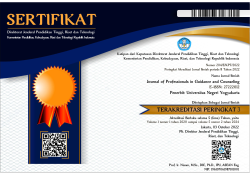The development and validation of student career planning inventory (SCPI)
Downloads
Downloads
Arastaman, G. (2018). Reconsidering the Career Construction in Modern Era. In T. Fidan (Ed.), Vocational Identity and Career Construction in Education (pp. 1–15). IGI Global. https://doi.org/10.4018/978-1-5225-7772-0.ch001
Bilon-Piórko, A. D., & Rhomsen, R. (2022). A critical review of contemporary concepts of agency in the field of career guidance: life-design counselling and a systems theory framework. British Journal of Guidance and Counselling, 50(4), 533–546. https://doi.org/10.1080/03069885.2022.2101614
Briddick, W. C., Sensoy-Briddick, H., & Savickas, S. (2018). Career construction materials: the story of a career development curriculum in a Turkish school. Early Child Development and Care, 188(4), 478–489. https://doi.org/10.1080/03004430.2017.1423483
Cyphert, D., Holke-Farnam, C., Dodge, E. N., Lee, W. E., & Rosol, S. (2019). Communication Activities in the 21st Century Business Environment. Business and Professional Communication Quarterly, 82(2), 169–201. https://doi.org/10.1177/2329490619831279
Darmawani, E., & Suryahadikusumah, A. R. (2021). Career Adaptability as A Career Competency for Generation Z. E-Prosiding Webinar Konvensyen Kaunseling Kebangsaan Kali Ke-22, 62–73.
Duarte, M. E., Paixí£o, M. P., & da Silva, J. T. (2019). Life-Design Counselling from an Innovative Career Counselling Perspective. In Handbook of Innovative Career Counselling. https://doi.org/10.1007/978-3-030-22799-9_3
Fahmi, I., & Ali, H. (2022). Determination of Career Planning and Decision Making: Analysis of Communication Skills, Motivation and Experience (Literature Review Human Resource Management). Dinasti International Journal of Management Science, 3(5), 823-835.
Gregory, R. J. (2015). Psychological testing: History, principles and applications seventh edition. In Pearson Education. Allyn and Bacon.
Jackson, D. (2021). The changing nature of graduate roles and the value of the degree. Journal of Higher Education Policy and Management, 43(2), 182–197. https://doi.org/10.1080/1360080X.2020.1777634
Jackson, D., & Tomlinson, M. (2020). Investigating the relationship between career planning, proactivity and employability perceptions among higher education students in uncertain labour market conditions. Higher Education, 80(3), 435–455. https://doi.org/10.1007/s10734-019-00490-5
Karaca-Atik, A., Meeuwisse, M., Gorgievski, M., & Smeets, G. (2023). Uncovering important 21st-century skills for sustainable career development of social sciences graduates: A systematic review. Educational Research Review, 39(March). https://doi.org/10.1016/j.edurev.2023.100528
Kinayung, D., Ardiyanti, D., & Hidayat, M. (2020). Validation of Career Planning Guidebook for College Students. Jurnal Psikologi, 47(2), 151. https://doi.org/10.22146/jpsi.41478
Lazarova, M., Caligiuri, P., Collings, D. G., & De Cieri, H. (2023). Global work in a rapidly changing world: Implications for MNEs and individuals. Journal of World Business, 58(1), 101365
Maree, J. G. (2022). Using integrative career construction counselling to promote autobiographicity and transform tension into intention and action. Education Sciences, 12(2), 72.
Mockaitis, A. I., Butler, C. L., & Ojo, A. (2022). COVID-19 pandemic disruptions to working lives: A multilevel examination of impacts across career stages. Journal of Vocational Behavior, 138(May), 103768. https://doi.org/10.1016/j.jvb.2022.103768
Nurlela, N., & Surtiyoni, E. (2020). Barriers to the maturity of student's career planning as millennial generation. Jurnal Psikologi Pendidikan Dan Konseling: Jurnal Kajian Psikologi Pendidikan Dan Bimbingan Konseling, 6(1), 35–41. https://doi.org/10.26858/jppk.v6i1.13442
Puspasari, H., & Puspita, W. (2022). Uji Validitas dan Reliabilitas Instrumen Penelitian Tingkat Pengetahuan dan Sikap Mahasiswa terhadap Pemilihan Suplemen Kesehatan dalam Menghadapi Covid-19. Jurnal Kesehatan, 13(1), 65. https://doi.org/10.26630/jk.v13i1.2814
Retnawati, H., Munadi, S., & Al-Zuhdy, Y. A. (2015). Factor analysis to identify the dimension of Test of English Proficiency (TOEP) in the listening section. REiD (Research and Evaluation in Education), 1(1), 45–54. https://doi.org/ 10.21831/reid.v1i1.4897
Reysen, R. H., Winburn, A., Young, T., & Degges-White, S. (2017). Using Career Construction Theory to Supporting College Students's Transition from Their Undergraduate Studies. The Alabama Counseling Association Journal, 40(2), 34–54.
Rudolph, C. W., Zacher, H., & Hirschi, A. (2019). Empirical developments in career construction theory. Journal of Vocational Behavior, 111(December), 1–6. https://doi.org/10.1016/j.jvb.2018.12.003
Savickas, M. (2013). Career Construction Theory and Practice.pdf. In Career development and counseling: Putting theory and research to work. (pp. 147–183).
Savickas, M. L. (2002). Career Construction: A Developmental Theory of Vocational Behavior. In D. Brown (Ed.), Career Choice and Development: Four Edition (pp. 71–88). John Wiley & Sons, Inc. https://doi.org/10.1037/0000105-005
Savickas, M. L. (2013). Career Construction Theory and Practice. In S. D. Brown & R. W. Lent (Eds.), Career development and counseling: Putting theory and research to work. Second Edition. (pp. 147–183).
Savickas, M. L., & Porfeli, E. J. (2012). Career Adapt-Abilities Scale: Construction, reliability, and measurement equivalence across 13 countries. Journal of Vocational Behavior, 80(3), 661–673. https://doi.org/10.1016/j.jvb.2012.01.011
Savickas, M. L., Porfeli, E. J., Hilton, T. L., & Savickas, S. (2018). The Student Career Construction Inventory. Journal of Vocational Behavior, 106(June 2017), 138–152. https://doi.org/10.1016/j.jvb.2018.01.009
Shen, Q. (2021). The Importance of Integrating Career Planning Education into High School Curriculum. In 2021 4th International Conference on Humanities Education and Social Sciences (ICHESS 2021) (pp. 2115-2120). Atlantis Press.
Streiner, D. L. (2003). Starting at the beginning: An introduction to coefficient alpha and internal consistency. Journal of Personality Assessment, 80(1), 99–103. https://doi.org/10.1207/S15327752JPA8001_1
Tham, P., & Lynch, D. (2019). "˜Lost in transition?'–Newly educated social workers' reflections on their first months in practice. European Journal of Social Work, 22(3), 400-411.
Valls, V., González-Romá, V., Hernández, A., & Rocabert, E. (2020). Proactive personality and early employment outcomes: The mediating role of career planning and the moderator role of core self-evaluations. Journal of Vocational Behavior, 119(April 2018), 103424. https://doi.org/10.1016/j.jvb.2020.103424
Wehrle, K., Kira, M., & Klehe, U. C. (2019). Putting career construction into context: Career adaptability among refugees. Journal of Vocational Behavior, 111, 107-124.
Zacher, H., Rudolph, C. W., Todorovic, T., & Ammann, D. (2019). Academic career development: A review and research agenda. Journal of Vocational Behavior, 110(October 2017), 357–373. https://doi.org/10.1016/j.jvb.2018.08.006
 | ProGCouns: Professional Guidance and Counseling Journal is licensed under a Creative Commons Attribution-ShareAlike 4.0 International License. |
















